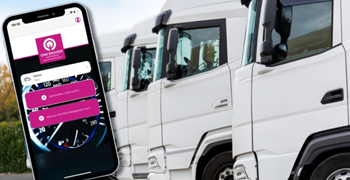25/04/2025
Q&A with Shane Ford
Schemes Manager Shane Ford talks to us about his career to date, including his experiences supporting the independent ambulance sector over the past 9 years.
When did you join One Broker?
I joined the company in the first week of July 2016. At that time, I mainly worked with haulage clients alongside Ian Limeburner. I also handled more general commercial insurance enquiries, covering a range of businesses and charities.
About 3 months in, I was invited to work on the Private Ambulance Insurance scheme. The team went through a period of rapid growth and needed extra support. Ever since then, the number of ambulance clients has increased – and is the focus of the work I do now.
What did you do before One Broker?
Aside from being an in-store baker while at university, I've been in insurance my whole career. I started with a national insurer close to where I live, and worked on their claims team. This was incredibly valuable for me to understand the complex needs of the policyholders during a claim, which could be a very stressful time. After that I found my home at One Broker.
Is there anything you particularly enjoy about working with the ambulance sector?
The variety – no two businesses are the same. Even if you’ve got two businesses that provide medical cover at events, one of them could be supporting Premier League clubs and the other could be doing Ironman-type events and endurance sports.
And then you’ve got NHS response on top of that, alongside people getting involved in mental health transfer and things like that as well.
Read more: Q&A with Mersey Medical Services
How much has your knowledge of the ambulance sector developed?
On reflection, it's become a huge part of my working life, and I feel more and more embedded in the private ambulance community. I remember one time a large professional football club had contacted me to help them arrange coverage for their match on Boxing Day one year, when their usual ambulance providers were not available. Although they had possibly misunderstood the nature of us 'covering' ambulance at such events, I could still help due to my connections throughout the private ambulance community. One of my clients was ideally placed, and was able to fill the requirements, so together the Boxing Day match was able to go ahead. I started with a misconception that the sector was mainly about St John's Ambulance and similar organisations, but over time, I came to realise that the private sector is integral to healthcare in the UK.
Have your ambulance clients seen any common challenges over the past ten years?
One of the trickiest parts of running a private ambulance business is navigating the regulatory elements. With the CQC making sure that organisations are up to scratch, and adequately insured, there can be a bit of confusion from companies about what cover they need - especially newcomers. Luckily our experience at One Broker Ambulance means we can help them understand what's required and find the right cover to help them pass through the regulatory process.
A lot of the challenges in the ambulance sector also came during the first Covid-19 lockdown when events were suspended. Event support businesses faced a lot of challenges. They lost a whole summer’s worth of work.
Obviously, there was also a lot more NHS help required, so event companies chipped in and helped there. We saw clients get involved with community testing and moving around samples, or providing support when the Nightingale hospitals opened, transferring patients between locations.
There’s a unique set of challenges for those organisations. They essentially had to change their business model overnight. Things became more clinically intense, which is a big change.
Risk management is of heightened importance now too, in order to protect staff and patients. Of course, medical companies already had good infection control, awareness and procedures - but the scale of coronavirus meant our clients had to learn and adapt very quickly.
Do you see any common ambulance claims?
We’re lucky that we don’t get many claims, although there are more on the Motor Insurance side. Things like hitting parked cars or fixed objects, such as bollards or walls. Those vehicles aren’t really designed for tight spaces and hospital car parks so they occasionally come into contact with fixed objects.
We don’t get many claims under blue-light conditions because drivers are trained so intensively. The amount of training and procedures that drivers go through to be able to drive under those conditions is so intense and rigorous it almost changes their thought processes completely. They’re constantly reviewing what’s going on in front of them on the roads and aware of potential risks.
Do you support the ambulance claims process?
When someone has their first claim, I tend to be their first port of call. I’ll give them a very brief walk-through of the process before getting in touch with Julie, Mel, and Nick on our dedicated Claims team. I’ll explain that they're going to look after them but I’m still on hand if they need me.
As I mentioned above, my own career began working as a claims handler for an insurer, so that’s given me a really good understanding of what the commercial claims process looks like. It is quite helpful to be able to explain that to a client.
How has working more frequently over video calls been over the last few years?
Interestingly, some clients have said they prefer video calls now, some people don’t want the hassle of having to block out two hours to talk to me – plus have to make me a cup of tea and biscuits! Now I can have my own tea and biscuits but we can still have face-to-face interaction, which really helps with relationship building. It means we’re not just a voice at the end of the phone.
Speak to Shane today!
If you’d like to find out more about our Private Ambulance Insurance – or would like to discuss your existing cover – call Shane on 01603 218250 or email shane.ford@onebroker.co.uk.
Related Articles





